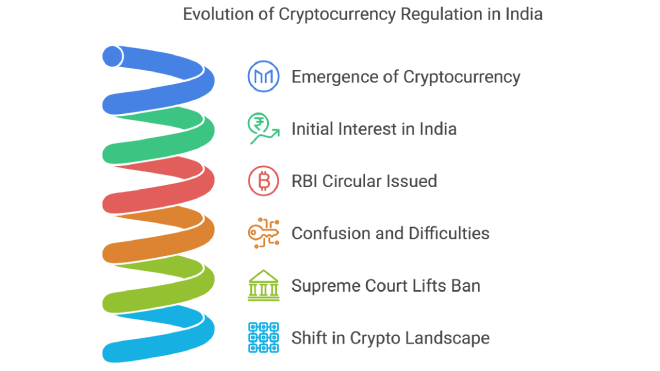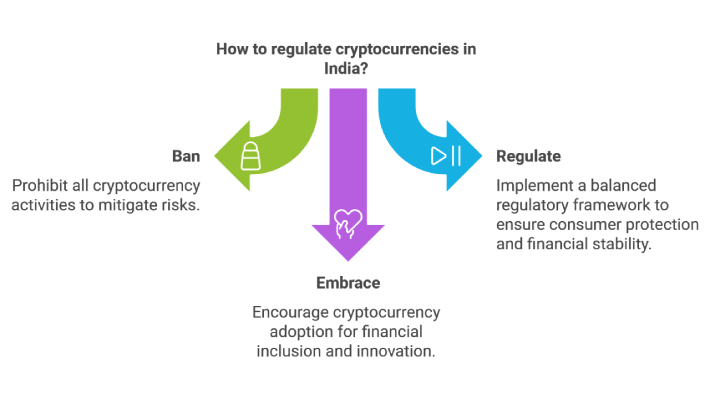As cryptocurrency continues to captivate global markets, India’s stance on digital assets remains a topic of intense debate and curiosity. With a history of regulatory ups and downs, India is navigating a challenging landscape of innovation, economic potential, and security concerns. While some see cryptocurrency as a gateway to financial freedom and technological advancement, others warn of its risks to economic stability and consumer protection. In this article, we’ll dive into the diverse perspectives shaping India’s approach to cryptocurrency, explore the possible future of digital assets in the country, and consider what these developments mean for investors and tech enthusiasts alike.
Cryptocurrency has to turn extraordinarily common, over the previous years surpassing all expectations. With greater than 1600 of them in 2018, the quantity has been continuously rising. India Divergent Views on Cryptocurrency details are below. So we learn together about India Divergent Views on Cryptocurrency.
Table of Contents
Historical Context of Cryptocurrency in India
Since cryptocurrency emerged globally, India’s stance has fluctuated. Initial interest was high, but regulatory challenges soon followed. In 2018, the Reserve Bank of India (RBI) issued a circular banning banks from supporting cryptocurrency transactions, leading to confusion and operational difficulties for India Divergent Views on Cryptocurrency businesses.
However, in 2020, the Supreme Court lifted this ban, marking a significant shift in India’s crypto landscape.This back-and-forth history underscores the complexities of regulating digital assets in a country with a vast, tech-savvy population but cautious regulators.
India Divergent Views on Cryptocurrency
Cryptocurrency mainly eliminates the issues of recent banking. Some of the preferred ones are Bitcoin, Litecoin, Ethereum, and Zcash. India Divergent Views on Cryptocurrency. Cryptocurrencies are primarily digitally created data, supported by blockchain expertise, that seizes, and reports who owns what quantity of that forex.
This report is captured in such a means that the report cannot be merely altered. Another fascinating characteristic of cryptocurrencies could also be a bit of an algorithmic program generally known as “proof of work”, which wants any person to “work” onerous to have the ability to confirm the newest transaction of saying a bitcoin being transferred from one proprietor to a different.
This “work” includes using a posh algorithm involving “proof of work” on computing infrastructure, and likewise, the very first one to unravel that algorithm will get to report the dealings and move it to any or all various digitally distributed ledgers. Within the method, the celebration confirming the transaction will get some bitcoin as a reward.
Seasoned market analyst Deepak Talwar observes- “As far as cryptocurrency is concerned in India, the government and investors hold opposing views on financial technology. Cryptocurrency in India is thriving, the market has been booming and retail investors showing unmatchable enthusiasm. With over 10 million crypto investors (increasing daily) most Indians are wholeheartedly accepting cryptocurrency.”
With the cryptocurrency gaining an edge over the others it’s important to supply vital info to the people concerning the identical. Deepak Talwar, an outstanding market veteran places ahead some benefits of Cryptocurrency.
The main ones are that it’s self-governed and managed, utterly safe and personal, and exchanging forex turns into a straightforward activity.
India Divergent Views on Cryptocurrency Deepak Talwar speak
Deepak Talwar additionally uncovers the opposite aspect i.e. some cons resembling, Bitcoins can be utilized as a mode of transaction in unlawful offers and it could be untraceable as it isn’t monitored by the federal government. India Divergent Views on Cryptocurrency are a great point.
The susceptibility to hacks can also be extraordinarily excessive. “After scrutinizing the configuration and the pros and cons of employing cryptocurrency, The Indian government has taken its stand role against that.“
It has proposed a bill for the reject Crypto that will ban cryptocurrencies. It is one of the world’s most stringent policies against cryptocurrencies and would criminalize possession, issuance, all the blockchain transaction mining, trading, and transferring crypto-all assets.” stated Deepak Talwar.
Most of the world’s developed international locations such as The United States, Canada, Australia, and the European Union have given a thumbs up and stated sure to the usage of cryptocurrency. Whereas Asian giants China and India together with Russia and Vietnam deny the prevalence of Bitcoins. India Divergent Views on Cryptocurrency.
An outstanding face of the Indian market, Deepak Talwar highlights the present state of affairs concerning Cryptocurrency in India and likewise the implications of the federal government’s inflexible stance on the matter. He says “ One year after the SC order, many institutes, and banks of India have become uncertain of providing financial services that regulate crypto-asset transactions.“
Banks such as ICICI Bank, HDFC Bank, SBI, and the Yes Bank had initially supported and provided services to crypto-based companies, some of them have started blocking the crypto transactions and are distancing themselves.”
Seasoned Market analyst Deepak Talwar covers all elements of Cryptocurrency within the Indian market, he additionally sheds mild on the present situation regarding Cryptocurrency within the nation. – Deepak Talwar
What occurs subsequently?
Apprehensive of a blanket ban, crypto exchanges, and buyers are fearing an exodus of each expertise and enterprise from India, just like what occurred after the RBI’s 2018 ban.
Back then, blockchain specialists moved to international locations the place crypto was regulated, resembling Switzerland, Singapore, Estonia, and the US. India Divergent Views on Cryptocurrency.
Overview of Current Regulatory Status
In recent years, India has been moving towards defining a comprehensive regulatory framework. The government is reportedly working on a bill to either regulate or potentially ban certain private cryptocurrencies, with discussions around launching a central bank digital currency (CBDC) as a regulated alternative.
This cautious approach reflects India Divergent Views on Cryptocurrency intent to balance innovation with stability, ensuring that digital assets do not undermine the nation’s financial ecosystemIt is anticipated that any upcoming regulations will address tax implications, Know Your Customer (KYC) requirements, and anti-money laundering (AML) practices, though the details remain to be seen.
Future Prospects: What Lies Ahead for India Divergent Views on Cryptocurrency
India’s cryptocurrency future largely depends on the regulatory framework the government chooses to implement. If balanced regulations allow for innovation while addressing security concerns, India could emerge as a major player in the global crypto landscape. However, a restrictive approach might push crypto activities underground or offshore, limiting economic opportunities.
As global acceptance of crypto grows, India may eventually align its policies with international standards to foster technological advancements while safeguarding its financial ecosystem and India Divergent Views on Cryptocurrency.
India Divergent Views on Cryptocurrency:
- Regulatory Concerns: Indian authorities have expressed concerns about the unregulated nature of cryptocurrencies, citing potential risks such as money laundering, terrorist financing, and consumer protection issues. Some policymakers believe that cryptocurrencies could facilitate illicit activities and destabilize the financial system.
- Central Bank’s Stance: The Reserve Bank of India (RBI), the country’s central bank, has been cautious about cryptocurrencies. In 2018, the RBI issued a circular prohibiting banks from providing services to individuals or entities dealing with cryptocurrencies. However, in 2020, the Supreme Court of India overturned the ban, allowing cryptocurrency trading to resume.
- Legislative Proposals: The Indian government has considered introducing legislation to regulate cryptocurrencies. In 2019, a draft bill titled “Banning of Cryptocurrency and Regulation of Official Digital Currency” proposed a complete ban on cryptocurrencies and the introduction of a central bank digital currency. However, the bill has not been enacted yet, and there have been discussions about a more balanced regulatory framework.
- Potential Benefits: Some proponents of cryptocurrencies in India argue that they offer various advantages, such as financial inclusion, decentralized finance, and cross-border remittances. They believe that cryptocurrencies could empower individuals and businesses, especially in rural areas, by providing access to digital financial services.
- Technology Development: India has recognized the potential of blockchain technology, the underlying technology behind cryptocurrencies. The government has shown interest in exploring blockchain applications in sectors like supply chain management, land records, and healthcare.
- Investor Interest: Despite regulatory uncertainties, there is a growing interest in cryptocurrencies among Indian investors. Many individuals have invested in cryptocurrencies as a speculative asset or as an alternative investment option. However, this has also raised concerns about investor protection and market stability.
- Government’s Approach: The Indian government has established committees and task forces to study cryptocurrencies and propose regulations. The approach varies within different government departments, with some advocating for a complete ban while others call for balanced regulations that mitigate risks while fostering innovation.
It is worth noting that the situation regarding cryptocurrencies in India is dynamic, and regulations may evolve as the government continues to assess the benefits and risks associated with cryptocurrencies. Hopefully, you get an idea of India Divergent Views on Cryptocurrency.
The Role of Central Bank Digital Currency (CBDC) in India
As an alternative to decentralized cryptocurrencies, the RBI is exploring the concept of a Central Bank Digital Currency (CBDC), a government-issued digital rupee. This initiative aims to provide a digital form of currency that retains government control while offering the efficiencies associated with digital transactions. India Divergent Views on Cryptocurrency
The CBDC could address concerns related to crypto by offering a regulated digital currency, allowing the government to monitor financial transactions more effectively while minimizing risks associated with unregulated digital assets.
FAQ On India Divergent Views on Cryptocurrency
1. What is the current legal status of cryptocurrency in India?
- Cryptocurrency is currently legal in India, but it is not formally regulated. The government is considering new regulations, which could potentially limit or structure crypto usage, but no definitive laws have been passed yet.
2. Why is India cautious about adopting cryptocurrency?
- India is cautious due to concerns over financial security, potential misuse for illegal activities, and the impact on traditional banking. The government seeks to prevent financial instability while promoting innovation.
3. How does a Central Bank Digital Currency (CBDC) differ from traditional cryptocurrencies?
- A CBDC is a digital currency issued and regulated by the government, unlike decentralized cryptocurrencies like Bitcoin. It retains central oversight and aims to offer a secure digital payment solution within the national financial framework.
4. Can I use cryptocurrency legally for purchases in India?
- While individuals can buy and hold cryptocurrency, using it for purchases is limited as most businesses in India do not accept crypto payments due to regulatory uncertainty.
5. What are the risks associated with investing in cryptocurrency in India?
- Risks include market volatility, potential scams, lack of consumer protections, and regulatory changes. Investors should be aware that crypto investments can be highly speculative.
6. What is the future of cryptocurrency regulation in India?
- India’s government is actively exploring regulation. Future policies may focus on protecting investors, preventing illegal activity, and ensuring that crypto doesn’t threaten financial stability.
7. How popular is cryptocurrency in India?
- Cryptocurrency has gained significant popularity, particularly among younger investors. However, security and legality concerns have slowed adoption compared to other nations.
8. Will India ban cryptocurrency in the future?
- While India has previously considered a ban, the government now appears more focused on regulation than prohibition. A ban seems less likely as officials recognize the economic potential of blockchain technology.
9. How is India’s approach to cryptocurrency different from other countries?
- India is more conservative compared to countries like the U.S. or Japan, which have embraced cryptocurrency with regulated frameworks. India’s approach emphasizes cautious exploration to protect its financial system.
10. Are there any tax implications for cryptocurrency investments in India?
- Currently, India does not have specific tax regulations for cryptocurrency, but earnings from crypto might be subject to capital gains tax. Future regulations could clarify tax treatment for crypto assets.
Conclusion
India’s journey with cryptocurrency is one of caution, curiosity, and potential. As the government weighs the benefits of innovation against the risks of financial instability, the nation stands at a pivotal point in its digital finance evolution. While regulatory uncertainty persists, interest in crypto remains high among the public and tech communities. If India can strike a balanced approach that fosters innovation while safeguarding its economy, it may unlock substantial economic growth and become a global leader in blockchain technology. As the future unfolds, staying informed about regulatory changes will be crucial for anyone involved in India’s dynamic cryptocurrency landscape.





